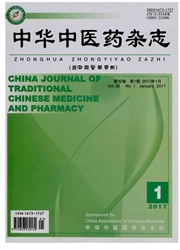

 中文摘要:
中文摘要:
目的:探讨雌激素受体β基因(ERβ)多态性(rs3020444)与围绝经期综合征肝气郁结证(气郁证)的关系。方法:选择围绝经期综合征气郁证患者100例、非气郁证86例和正常对照组100例,应用聚合酶链反应-限制性片段长度多态性(PCR-RFLP)法检测ERβ-T/C多态性。结果:卡方分割显示气郁证组的TT频率(84.0%)高于与非气郁证组(68.6%)及对照组(68.0%),差异显著(P=0.004);气郁证组T等位基因频率(91.0%)高于与非气郁证组(83.1%)及对照组(82.5%),差异显著(P=0.008);Logistic回归分析,以非气郁证组为参照系,调整混杂因素后TT基因型患气郁证的相对危险度为2.222(95%可信区间:1.172-4.744,P=0.015)。结论:ERβ-TT基因型可能是围绝经期综合征气郁证发病的易感因素之一。
 英文摘要:
英文摘要:
Objective:To investigate the association between polymorphisms of estrogen receptor β (ERβ) gene (rs3020444) and perimenopausal syndrome (PS) in patients with liver qi stagnation syndrome (LQSS). Metheds:The ERβT/C genotype in 100 patients of PS of LQSS type (PS-LQSS group),86 patients of PS of non-LSDS type (PS-non-LQSS group) and 100 healthy subjects (control) was determined by polymerase chain reaction and restriction fragment length polymorphism (PCR-RFLP) assay. Results:Partitions of χ^2 method showed that the higher prevalence of ERβ-TT genotypes was noted in PS-LQSS group (χ^2=8.307,P=0.004),and the higher prevalence of T alleles was noted in PS-LQSS group (χ^2=7.129,P=0.008). and Multinomial logistic-regression indicated that the odds ratios (OR) of the ERβ-TT genotypes vs TC/CC for PS-LQSS was 2.222 (95%CI:1.172-4.744,P=0.015) after adjusting for common miscellaneous factors. Conclusions:It was suggested that ERβ-TT genotypes was significantly associated with PS-LQSS,and ESRβ-TT may be one of the genes that contribute to PS-LQSS.
 同期刊论文项目
同期刊论文项目
 同项目期刊论文
同项目期刊论文
 期刊信息
期刊信息
